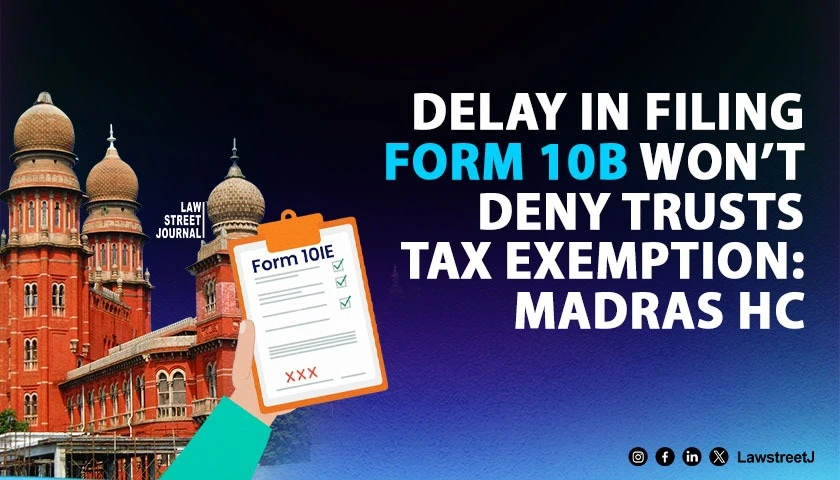Chennai: The Madras High Court has ruled that a delay in filing statutory Form 10B should not deprive an assessee of legitimate tax exemptions, emphasizing that procedural requirements are the handmaids of justice and not its mistress—particularly for trusts in their first year of operation.
Justice C. Saravanan examined whether procedural non-compliance should override substantive entitlements to tax benefits while hearing a challenge to the Income Tax Department’s refusal to condone filing delays.
The court heard Writ Petition No. 6814 of 2025 filed by Sivestar Educational Trust challenging an order dated November 28, 2024, passed by the Commissioner of Income Tax (Exemption), rejecting its application to condone a delay of 151 days in filing Form 10B for Assessment Year 2018–19.
The petitioner trust was registered under Section 12A of the Income Tax Act on March 30, 2017. As a registered trust, it was required to file both the return of income and Form 10B as mandated under Section 44AB. While the original deadline for Form 10B was September 30, 2018 (later extended to October 31, 2018), the trust filed it along with its return on March 31, 2019, resulting in a 151-day delay.
An intimation under Section 143(1) was issued on October 17, 2019, to finalize the return. The trust thereafter approached the Commissioner under Section 119(2)(b) seeking condonation of delay.
The Commissioner rejected the application, observing that the trust attributed the delay to Cyclone Gaja, which formed on November 10, 2018, and dissipated on November 22, 2018. However, since the due date for filing was October 31, 2018—prior to the cyclone—the Commissioner held that the reasons were vague and appeared to be an afterthought, noting: “The assessee has not established any reasonable cause for the delay in filing Form 10B for Assessment Year 2018–19.”
Counsel for the petitioner relied on several Madras High Court decisions, including RBS Students Welfare Trust, Coromandel Cables Pvt. Ltd., and St. Thomas Charitable Trust, to argue that procedural delays should not defeat substantive rights.
The Revenue, on the other hand, relied on Wipro Ltd. (Supreme Court) and several Delhi and Madras High Court judgments dealing with mandatory compliance for exemption provisions.
Justice Saravanan reiterated that while exemption provisions must be strictly complied with—as held in Wipro Ltd.—each case must be examined contextually. He observed:
“The petitioner did not gain anything by not filing Form 10B in time. Ultimately, the Income Tax Department is expected to collect just taxes that are due from an assessee. If an assessee is entitled to any deductions, the same should not be denied merely due to procedural delay.”
The court emphasized:
“Delay in filing statutory declarations or documents should not come in the way of granting exemptions or deductions, where the assessee is otherwise entitled to such benefits.”
Justice Saravanan referred to Formica India Division v. Collector of Central Excise, where the Supreme Court held that while confirming demands, all attendant benefits available to an assessee must be extended. He also invoked Commissioner of Sales Tax v. Auriya Chamber of Commerce, observing that “procedures are rule-makers—handmaids of justice, not mistresses of law.”
Further, relying on Unichem Laboratories v. Commissioner of Central Excise, he noted:
“Authorities functioning under the Act must protect the interest of revenue by levying and collecting tax in accordance with law—no less and no more. It is no part of their duty to deprive an assessee of lawful benefits merely to augment revenue.”
The judge underscored the contextual aspect:
“In this case, the petitioner was registered as a trust in 2017 and had effectively commenced operations on April 1, 2017. The failure occurred in the first year of its operation. Therefore, the delay in filing Form 10B under Section 44AB for the purpose of Section 12A(1)(b) of the Income Tax Act, 1961, should not impede the petitioner’s legitimate entitlement to exemptions or deductions.”
The court allowed the writ petition, directing the petitioner to donate ₹25,000 by way of demand draft to the Chairman/Honorary Secretary, Blue Cross of India, Chennai, within 30 days. Upon compliance, the impugned order would stand quashed, and the Assessing Officer was directed to complete the assessment in accordance with law.
Mr. Suhrith Parthasarathy, Advocate, appeared for the petitioner, while Mr. V.J. Arul Raj, Senior Standing Counsel, represented the Revenue.
Case Title: Sivestar Educational Trust v. Commissioner of Income Tax (Exemption)




![TN Medical Council declares change of gender identity of LGBTQIA+ as misconduct [Read Notification]](/secure/uploads/2022/12/lj_5268_5cebb05a-97fb-40fb-8045-25cdf8f4207a.jpg)
![Madras High Court Directs Tamil Nadu Government to Ensure Quota for Transgenders in Local Body Elections [Read Order]](/secure/uploads/2023/08/lj_2507_7a03d113-08b1-4670-b6fb-9058aee481d0.jpg)
![Anti Corruption sleuths acted like "puppets in The Muppet Show", HC notice to ex TN CM in disproportionate assets case [Read Order]](/secure/uploads/2023/09/lj_8675_7b37fc02-1b2d-4f4a-9816-3df20545b37e.jpg)






